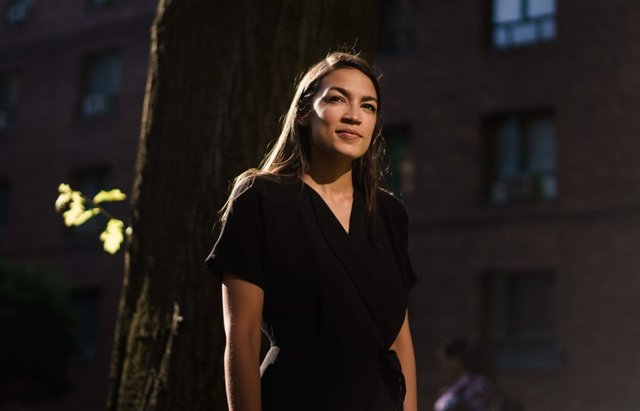The Democratic Party establishment has desired to nominate more moderate candidates, even in safe Democratic areas where they could not use their questionable arguments that more moderate candidates are more electable. Earlier in the year we saw examples of how the party establishment has attempted to suppress insurgent candidates. The New York Times notes how the Democratic Party establishment is having problems this year:
...Democratic voters and activists have increasingly succeeded at transforming their party into a more ambitious liberal force. In key races, they have also replaced elected leaders with newcomers who look and sound like the diverse, youthful base that the party relies on in presidential elections but that asserts itself sparingly in midterm elections and down-ballot primaries.While we are undoubtedly seeing a reaction against Donald Trump, the changes in the Democratic Party are likely to be more a reaction to how the party leaders forced a candidate as conservative as Hillary Clinton on the party in 2016--and the excitement created by the campaign run by Bernie Sanders. The winners this year also make a mockery of the bogus "Bernie Bros" smears used by Clinton supporters against the left. Alexandria Ocasio-Cortez, Ayanna Pressley, Jahana Hayes, and Andrew Gillum are certainly not the stereotypical white male Bernie Bros which Clinton supporters falsely claimed made up their opposition.Should that mood of insurgency prevail on Election Day, it could set the stage for an even more tumultuous phase of redefinition next year: A liberal base that feels validated after November may be unlikely to heed calls from party leaders to pick their battles in the new Congress, or to approach the 2020 race with sensitivity to more conservative sections of the country. The next presidential primaries could become a climactic test for the awakened Democratic base, with women and candidates of color holding an appeal others might struggle to match.
Martin T. Meehan, a former member of Congress from Massachusetts, a state rocked on Tuesday by primary upsets, said Mr. Trump had helped fuse once-fractious Democratic constituencies into a powerful alliance for primary season. Mr. Meehan, now the president of the University of Massachusetts, likened it to earlier moments of political realignment, when ethnic groups like Italian-, Irish- and Greek-American voters learned to work together in the middle of last century...
The most dramatic upsets have come in New York, where Alexandria Ocasio-Cortez, a 28-year-old activist and former bartender, defeated Representative Joseph Crowley, a Democratic boss in Queens and Washington, in a June primary; and Massachusetts, where Ayanna Pressley, a 44-year-old member of the Boston City Council, on Tuesday wrested the nomination away from Representative Michael Capuano, a 10-term progressive she branded as passive and conventional. Both women channeled liberal alarm at Mr. Trump and at social inequality in their own communities, and promised an unyielding fight for change...
In some revealing open-seat races, Democratic voters have also flouted the directives of party leaders and embraced inspiring activists. They nominated Jahana Hayes, an African-American educator, for Congress in Connecticut over a candidate approved by the state Democratic Party, and picked Andrew Gillum, the African-American mayor of Tallahassee, for governor of Florida over a field of better-funded candidates that included the scion of an imposing dynasty.
...Democratic insurgents predict that the party’s shifting attitude toward primary elections is more likely to intensify than recede. As Republican power brokers have found in recent years, once-potent instruments for enforcing partisan hierarchy have diminished in value: Political newcomers have deftly used online fund-raising and social media-based campaign tactics to replace the access to big donors and television airwaves that party leaders can more easily control.
And in Washington, as the number of Democratic upstarts elected to Congress grows, party leaders may face new pressures in navigating primary elections..
In keeping with Massachusetts political convention, Mr. Capuano mobilized a set of muscular institutions behind him, drawing endorsements from labor unions and influential Democrats including Boston’s mayor, Martin J. Walsh; Deval Patrick, the state’s first African-American governor; and black congressional leaders like John Lewis and Maxine Waters.
All that support was not decisive, and Ms. Pressley won by 17 points.Sam Yoon, a former member of the Boston City Council, said Ms. Pressley’s victory had exposed a momentous cultural transition in the party. Mr. Yoon, 48, mounted a campaign nearly a decade ago against the legendarily iron-fisted former mayor, Thomas M. Menino, attempting unsuccessfully to energize young progressives and minority communities in a movement for change.
“I think the dynamic is just wide-open now,” Mr. Yoon said. “The establishment doesn’t have the hold that it used to.”
Among those now excited by the successes of the left are Barack Obama, who has returned to public life this week in a speech praising Medicare for all: "Democrats aren't just running on good, old ideas like a higher minimum wage. They're running on good, new ideas like Medicare for all," Obama said. Perhaps Obama should have backed Sanders in 2016 over the Clinton, who campaigned against the plan. At very least, someone who had become president with promises of hope and change should have realized that a candidate as conservative and corrupt as Hillary Clinton was a poor choice in a year when voters demanded change.

Hi! I am a robot. I just upvoted you! I found similar content that readers might be interested in:
https://www.nytimes.com/2018/09/08/us/politics/democratic-party-midterms.html
Downvoting a post can decrease pending rewards and make it less visible. Common reasons:
Submit